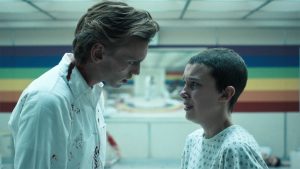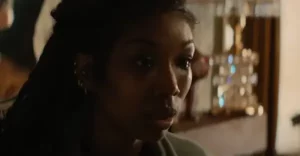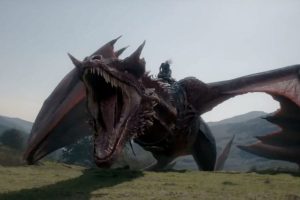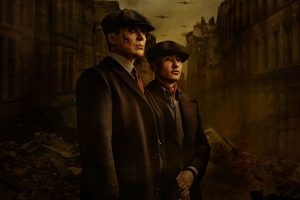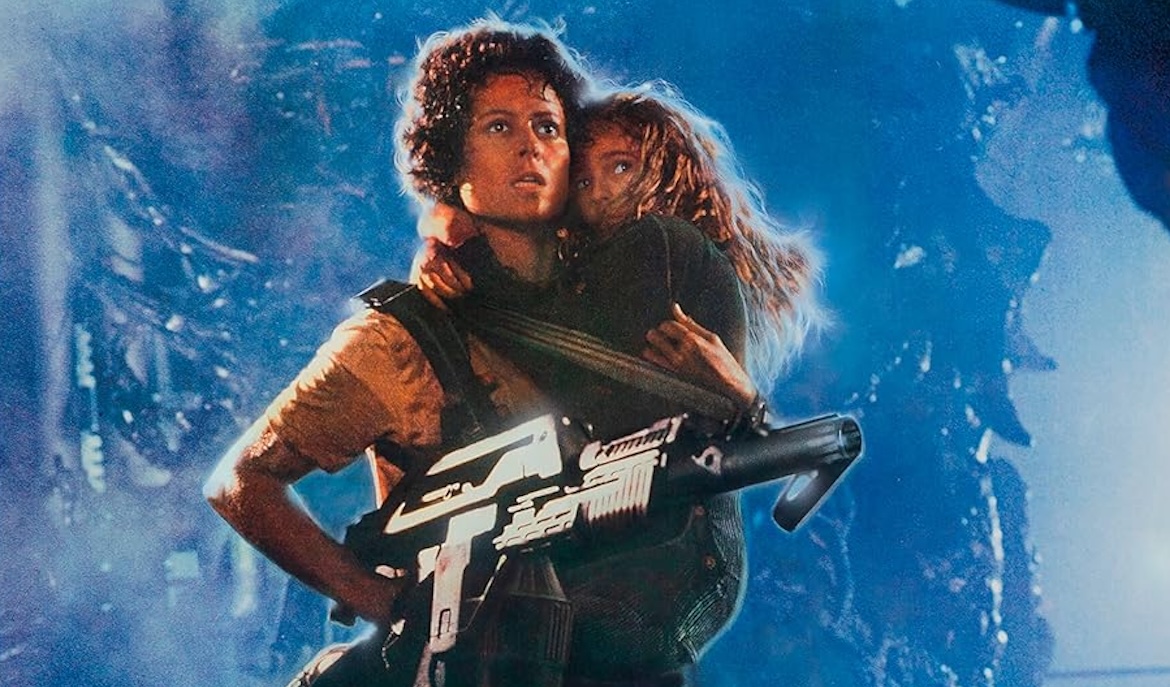
Science fiction cinema came of age in the 1950s, beginning an ascent out of the drive-in schlock market that culminated in the boldly experimental yet still commercially viable efforts of the 1960s. That fed directly into the next decade, with sci-fi in the 1970s taking on (for the most part) the same subversive attitude as most other movies made during that era.
But sci-fi movies also entered blockbuster territory in the ‘70s as demonstrated by the massive success of films like Star Wars, Close Encounters of the Third Kind, Superman: The Movie, Logan’s Run, and Alien. The studios realized that sci-fi could be a cash cow, and as the 1980s dawned, decided to ramp up their genre output, not to mention their budgets, with elaborate visual effects, bigger stars, and more action—even if some of the more cerebral concepts espoused in the earlier decades’ films took a bit of a back seat.
Nevertheless, the decade was marked by both undisputed crowd-pleasers—the Star Wars and Star Trek sequels, Aliens, E.T.: The Extra-Terrestrial—as well as some inarguable classics, like The Thing and Blade Runner, that just needed time to find their audience and critical acclaim. Looking back now at the best sci-fi movies of the ‘80s, one realizes that it was just as fertile and enriching a time as any other decade.
The Empire Strikes Back (1981)
As we’ll soon see, some of the genre’s greatest movies during the 1980s turned out to be sequels—a turnaround from previous years when films like Beneath the Planet of the Apes struggled to match the success of their predecessors. And 1981 kicked it off with perhaps the greatest sci-fi follow-up of them all. With a single line of dialogue, Irvin Kershner’s The Empire Strikes Back transformed Star Wars from a harmless pulpy space opera homage into a myth of arguably Shakespearean dimensions. Empire improved on just about everything in the original film and, for better or worse, turned it into one of our enduring pop culture legends. And you know what? It’s still one hell of a movie.
The Road Warrior (1981)
Even now, as the film industry begins to dissect what went wrong at the box office with Furiosa, we can look back to the second film in George Miller’s post-apocalyptic saga (called Mad Max 2 outside the U.S.) and see what went right. The Road Warrior is a mean, lean action machine, fully realizing its deeply damaged world even while on a budget that was literally a fraction of Furiosa’s. It also expands on a story started with Mad Max three years earlier. Mel Gibson has never been better as the story’s taciturn antihero, and Miller’s argument that humanity and morality can still exist in a desolate world where brutality rules over all, with the help of some supercharged motor vehicles, found its footing here.
Star Trek II: The Wrath of Khan (1982)
While 1979’s Star Trek: The Motion Picture was an earnest if bloated attempt to transfer the wildly popular crew of the starship Enterprise to the big screen, Nicholas Meyer’s sequel was a soft reboot that rediscovered what fans loved about the original TV series in the first place. A rumination on aging, death, and responsibility, not to mention a crackling good and witty tale of revenge (with one hell of a supervillain at its heart), Star Trek II brought out the best in the original cast and raised the stakes for Captain Kirk (William Shatner) and his crew higher than ever before. With this film, one of sci-fi’s most heralded franchises was back for good.
E.T.: The Extra-Terrestrial (1982)
Was the summer of 1982 arguably the greatest ever for sci-fi movies? No less than four genuine classics came out during that season, but this was the only one that was an undeniable blockbuster right out of the gate. Not just a sci-fi gem but one of the finest family films of all time, Steven Spielberg’s masterpiece about a boy and his alien friend remains a profoundly moving fable about growing up, loss, and childhood, as well as one of the director’s most personal cinematic visions. There isn’t much that can be said about E.T. that hasn’t been said already except that whether you watch it at the age of 10 or 50, the film still grabs you by the heart and doesn’t let go.
The Thing (1982)
Two seminal sci-fi films came out on June 25, 1982 and both tanked at the box office, unable to withstand the juggernaut that was E.T. Yet both also went on to become landmarks in the genre, with their influence felt to this day. The first was John Carpenter’s The Thing, not so much a remake of the 1951 classic but a fresh adaptation of the novella it was based on (Who Goes There? by John W. Campbell, Jr.). Like Alien three years earlier, Carpenter combined body horror with sci-fi elements to create a masterpiece of paranoia and dread, along with one of the ghastliest alien menaces ever visualized for the screen. Sure, the human characterizations are a bit lacking, but the underrated cast (Kurt Russell, Keith David, Wilford Brimley, and others) sell it from start to finish.
Blade Runner (1982)
Based on Philip K. Dick’s novel Do Androids Dream of Electric Sheep?, director Ridley Scott’s all-timer would be described now as a “slow burn”—the rather thin plot, in which Harrison Ford’s hardboiled “blade runner” has to track down and kill four androids, tends to stretch one’s patience. But Blade Runner is still incredibly rewarding thanks to Scott’s immersive, detailed world-building, showing us a future Los Angeles which seems only minutes away in many respects. The ideas lurking below the film’s surface about identity, humanity, and what it means to be alive, are more relevant than ever, and Rutger Hauer’s work as the lead replicant remains a showstopper. A failure when it was released, Blade Runner is now acknowledged as one of the most influential films of the past 50 years.
The Terminator (1984)
James Cameron’s first major outing as a writer-director (not counting his debut, 1982’s Piranha II: The Spawning), The Terminator was a classic B-movie in every respect, from its low budget to its basic slasher premise disguised inside wild sci-fi trappings. But Cameron’s assured direction and unrelenting narrative momentum from start to finish, as well as the creation of an instant icon with Arnold Schwarzenegger’s career-changing work as the titular android, elevated The Terminator to cult classic status and, later, franchise launching pad. Chilling, gruesome, and streamlined, The Terminator remains Cameron at his most minimalist, telling a time-spanning apocalyptic story through the eyes of just three characters.
2010 (1984)
It was already controversial when science fiction titan Arthur C. Clarke wrote a novel in 1982 titled 2010: Odyssey Two. That book served as a sequel to his iconic tome 2001: A Space Odyssey, which diverged from Stanley Kubrick’s film in a number of ways. Since Kubrick’s film was a masterpiece of ambiguity and mystery, the idea of continuing the story and explaining a lot of what happened in it seemed like folly. But Peter Hyams’ adaptation of Clarke’s second novel is respectful of its predecessor and a fine sci-fi movie in its own right. An excellent Roy Scheider leads a joint American-Soviet mission to discover what happened to the spaceship Discovery and its crew, only to encounter more enigmas and ultimately what the unseen aliens are up to out there. The film is full of ideas, the cast crackles, and there are a few moments of genuine awe. If you had to do a sequel to one of the greatest movies of all time, you could do a lot worse.
Back to the Future (1985)
The first adventure of Marty McFly (Michael J. Fox), Doc Brown (Christopher Lloyd), and their time-hopping DeLorean has often been described as a “perfect” movie, and that’s not inaccurate. Marty’s journey into the past, which jeopardizes his own existence in the present, is a rollicking, hilarious, suspenseful thriller. It’s also so elegantly conceived and written, with such top-notch performances, clearly-delineated characters and specific stakes, that it feels fresh no matter how many times you watch it. The two sequels add to the story without detracting from it, but the original movie stands alone as a singular sci-fi comedy achievement. In other words, a perfect movie.
Brazil (1985)
Terry Gilliam’s dystopian nightmare is in many ways an absurdist take on George Orwell’s 1984, which makes Gilliam’s constant barrage of jokes, honed to perfection through his years with Monty Python, even more disturbing. A young Jonathan Pryce is outstanding as the bland office drone who finally wakes up to the oppressive nature of the nameless state he serves, and Gilliam’s incredible eye for design shoves the artifacts of a government bureaucracy grown out of control and malevolent into every corner of the frame. Robert De Niro, Kim Greist, Michael Palin, and Ian Holm are all superb as well. Gilliam’s retro-futuristic look for the film has influenced tons of other pictures while the bleak ending stays with you long after the film is over.
Aliens (1986)
We mentioned earlier that the 1980s was a prime time for sequels, right? Well, James Cameron’s Aliens joins The Empire Strikes Back and Star Trek II in those hallowed ranks, and debate rages to this day whether it improves on Ridley Scott’s original. One thing is certain: Cameron wisely did not take the same tack as his predecessor, abandoning Scott’s house of horrors for a knockout military-vs.-the-aliens battle that doesn’t even begin until nearly an hour into the film. Not that you’re bored before that. Cameron slowly tightens the vise, building the tension before the explosive first confrontation with the xenomorphs while reintroducing us to a more fully realized Ripley (a towering Sigourney Weaver) and deploying his quirky, courageous, and empathetic space marines. It’s still our favorite Cameron joint.
The Fly (1986)
The word “masterpiece” gets thrown around a lot when talking about the filmographies of iconic directors like Spielberg, Coppola, and Scorsese—each of whom have a few to his credit—but it’s fair to say that David Cronenberg, that subversive specialist in the politics of the flesh, has notched a handful on his belt as well. There’s no doubt, however, that The Fly is his grandest achievement. Taking the rather silly (but still gripping) premise of the 1958 original and turning it into an allegory about disease and death (just as the AIDS crisis was really clamping down on the country), Cronenberg is aided in spectacular fashion by Jeff Goldblum, whose transformation into “an insect who dreamt he was a man” should have earned him an Oscar nomination. Unsettling and ultimately poignant, The Fly still soars.
Predator (1987)
Already an action sci-fi star thanks to The Terminator, Arnold Schwarzenegger no doubt wanted a piece of that alien action money when he signed onto Predator. Like a number of action films at the time, John McTiernan’s tale of a paramilitary rescue team encountering a hostile, technologically advanced alien being in a South American rainforest has been reappraised over the years as a classic of its genre (McTiernan, who did Die Hard right after this, was one of the great action helmers of his time). Schwarzenegger and the rest of the cast (including Carl Weathers) are terrific, the creature effects from Stan Winston are outstanding, and while the movie does not have the same depth as other gems from this era, it’s a pulse-pounding sit throughout.
RoboCop (1987)
Brutally violent yet possessed of a wickedly sharp, vicious wit, Paul Verhoeven’s RoboCop is not just a fantastic sci-fi/action thriller, but one of the great social satires of its decade. Slamming the trickle-down economics of the Reagan regime, the heartless capitalism of major corporations, and the antagonistic violence of modern police forces, RoboCop even manages to find an emotional core in the performance by Peter Weller as Alex Murphy, a murdered cop who gradually retrieves his memories and humanity when he’s revived as the title cyborg. Filled with iconic lines and indelible characters, RoboCop was also eerily ahead of its time with its implications about AI and corporate control of every aspect of our lives.
They Live (1988)
John Carpenter’s ultimate conspiracy theory movie in which aliens have covertly taken over society (their true form is only visible thanks remarkably to a pair of magic sunglasses) is generally regarded these days as one of his best and certainly one of his most thematically ambitious films. But back when it first came out, while it did modestly well at the box office, it was dismissed by critics and seemed to fade quickly from view. Time and the long arc of film criticism has been kinder to it since, and while it may be a bit dated in a number of aspects (including Roddy Piper’s borderline amateurish performance), Carpenter’s incisive view of consumer society and corporate dominance remains sharply satirical and unsettling.
The Abyss (1989)
A deep-sea oil rig crew must work with a military search-and-rescue team to locate a sunken American submarine and retrieve its nuclear weapons before the Soviets can. But there are other things lurking down in the darkest recesses of the ocean as well, and they’re coming to the surface. The Abyss was considered James Cameron’s first (and so far only) box office failure when it came out, but the restoration of his original, longer cut (and the recent, stunning Ultra HD Blu-ray release) have confirmed this to be in some ways his most deeply personal film, not to mention a riveting sci-fi thriller with incredible underwater sequences and visual effects. What a way to end the decade for one of the genre’s true auteurs.
The post The Best Sci-Fi Movies of the 1980s appeared first on Den of Geek.

